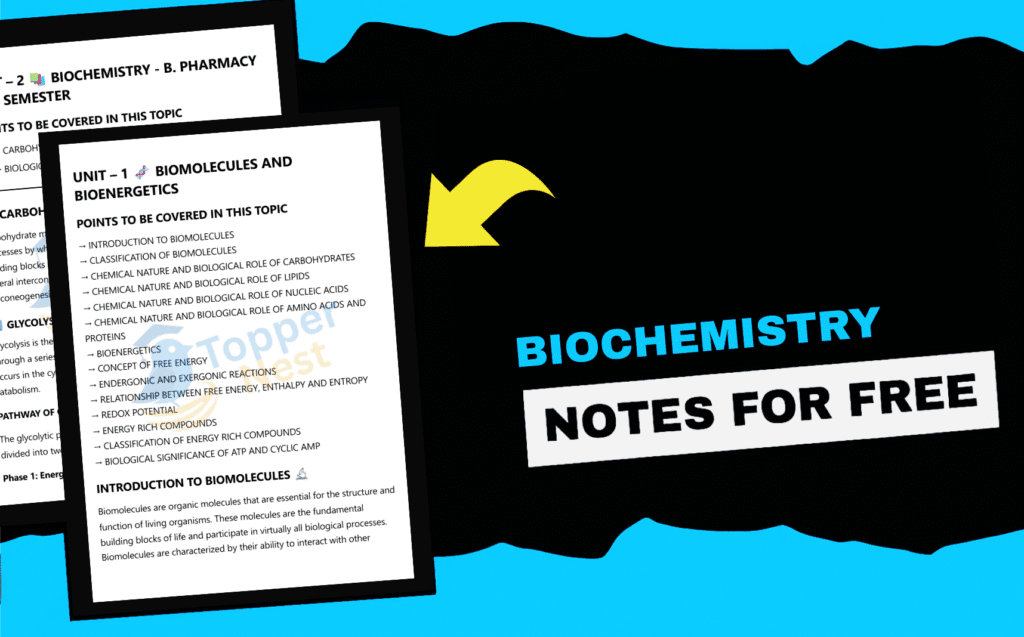Starting your professional course journey? One of the most essential subjects you’ll encounter in your first year is Biochemistry. This subject builds your foundation in the chemistry of life, focusing on the structure, properties, and functions of biomolecules, which are vital for understanding drug action, metabolism, and various physiological processes in pharmaceutical and health sciences.
Our Biochemistry Notes are carefully prepared to make your study experience simple, well-structured, and exam-focused. Whether you need clear explanations of the basics of carbohydrates, proteins, lipids, nucleic acids, enzymes, or metabolic pathways, these notes are designed to help you grasp the concepts thoroughly and retain them effectively.
These notes will not only support your classroom learning but also serve as a quick reference guide before exams. With detailed diagrams, step-by-step explanations, important definitions, and practice questions, Biochemistry Notes make your preparation easier, more efficient, and exam-ready.

What is Biochemistry?
Biochemistry, particularly in the context of a B.Pharmacy program, is the study of the chemical processes and substances within living organisms and how they interact with drugs. It’s a foundational science that bridges the gap between biology and chemistry, providing an essential understanding of the molecular basis of life. In pharmacy, this knowledge is critical for understanding how drugs work in the human body.
Core Concepts of Biochemistry
The biochemistry curriculum in B.Pharmacy typically covers several key areas:
- Biomolecules: This includes the structure, classification, and function of essential biological molecules such as carbohydrates, lipids, proteins, and nucleic acids (DNA and RNA). Understanding these molecules is the starting point for comprehending all other biochemical processes.
- Enzymes: Enzymes are biological catalysts that speed up chemical reactions in the body. Pharmacy students learn about enzyme kinetics, how they are regulated, and the importance of enzyme inhibitors. This is particularly relevant to drug design, as many drugs function by inhibiting specific enzymes to treat diseases.
- Metabolism: This is the study of the chemical reactions that occur in the body to maintain life. The curriculum focuses on the metabolic pathways of carbohydrates, lipids, and proteins. Understanding these pathways is crucial for a pharmacist to comprehend how drugs are absorbed, distributed, metabolized, and excreted (ADME).
- Molecular Biology and Genetics: This area covers the structure and function of DNA and RNA, including processes like DNA replication, transcription, and translation. This knowledge is becoming increasingly important in pharmacy for understanding genetic disorders, personalized medicine, and the development of new gene-based therapies.
- Clinical Biochemistry: This component focuses on the biochemical changes associated with various diseases. For example, students learn about the biochemical basis of conditions like diabetes mellitus, gout, and liver disorders. This knowledge helps pharmacists interpret lab results and understand the rationale behind specific drug treatments.
Unit-wise Notes for Biochemistry
Why Biochemistry is Important in B. Pharmacy
Biochemistry is a cornerstone of the B.Pharmacy curriculum because it provides the fundamental knowledge necessary to understand how drugs interact with the human body at a molecular level. It connects the principles of chemistry to the biological processes of life, which is essential for a career in pharmacy.
Key Reasons for its Importance in B.Pharmacy
- Understanding Drug Action and Mechanisms: Biochemistry explains how drugs bind to and interact with specific molecules in the body, such as receptors and enzymes. This knowledge is crucial for a pharmacist to understand how a drug produces its therapeutic effect and what its potential side effects might be.
- Drug Metabolism and Pharmacokinetics: It provides insight into how the body processes drugs—a field known as pharmacokinetics. Biochemistry helps explain how drugs are absorbed, distributed, metabolized by enzymes in the liver, and eventually eliminated from the body. This is vital for determining correct dosages, managing drug interactions, and predicting a drug’s half-life.
- Disease Pathology: Many diseases have a biochemical basis. By understanding the chemical changes that occur in the body during a disease state, pharmacists can better appreciate why certain drugs are used to treat those conditions. For example, a thorough understanding of carbohydrate metabolism is essential for comprehending and managing a condition like diabetes.
- Drug Design and Development: Knowledge of biochemistry is fundamental for the research and development of new drugs. It allows scientists to design molecules that can specifically target biochemical pathways to prevent, cure, or manage a disease with minimal side effects.
- Biochemical Testing: Pharmacists often interpret clinical lab results. An understanding of biochemistry allows them to interpret tests related to blood glucose, cholesterol, liver enzymes, and other biomarkers, providing them with a more complete picture of a patient’s health and the effectiveness of their medication.
Benefits of Our Biochemistry Notes
Looking for a reliable study resource to excel in Biochemistry during your B. Pharmacy course? Our professionally curated notes at Toppernest.com are designed to help you understand essential biochemical concepts, enzyme mechanisms, metabolism of carbohydrates, proteins, and lipids, as well as the structure and function of biomolecules with ease and confidence.
These notes simplify complex topics with clear explanations, well-labeled diagrams, and exam-focused highlights, making them the perfect companion for your studies. Whether you need quick revision before exams or detailed conceptual support, our Biochemistry notes ensure you gain both theoretical understanding and practical application skills for academic success.
